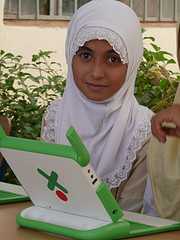There I am this morning, reading a captivating story in the New York Times. "U.S. Gift for Iraqis Offers a Primer on Corruption" tells the tale of a shipment of laptops destined for Iraqi schoolchildren that was lost in transit, with this key passage:
The computers - 8,080 in all, worth $1.8 million - were bought for schoolchildren in Babil, modern-day Babylon, a gift of the American taxpayers. Only they became mired for months in customs at the port, Umm Qasr, stalled by bureaucracy or venality, or some combination of the two. And then they were gone.
Laptop computers for children? Valued at $223 each? That's XO laptops from OLPC! Now the article doesn't say OLPC is involved, but I'll bet you a little green (or blue) computer, we're talking 8,080 XO-1's. And it makes me sad.
Sad that of the billions of dollars in goods that could be "misplaced" in Iraq, they chose XO's. Sad that yet another delay comes to learning learning. Sad that this is how OLPC makes headlines. Saddest of all that XO's were only valued at $10 each at auction:
Then, in August, Iraqis auctioned off 4,200 of the computers - for $45,700. The whereabouts of the rest are unknown..



I contacted the journalist who wrote the story to ask if they were OLPC ones, he confirmed they were OLPC machines but not part of the programme...
If it's not a typical home government OLPC dissemination then what is (was) it? Is it akin to what Negroponte had in mind for Afganistan?
I also emailed him and he told me the same thing. He added that "They were purchased by the local American military commanders, through the provincial reconstruction team in Babil."
The OLPC Iraq program is funded by a multi-agency task force from the USA:
"The PRT funded project is designed to enhance activities through individual expression. Teachers will promote the development of the technology and its many educational applications. At the same time, by their very nature, the laptops will promote greater collaboration among students, he explained.
Established in November 2005 PRTs are run by the State Department with volunteers drawn from various Federal agencies,like the U.S. Agency for International Development (USAID) and U.S. Department of Agriculture (USDA), Their aim is to partner with Iraqis to build capacity and empower local and regional governments to provide essential services. PRTs help refurbish schools, train journalists, upgrade farmer’s knowledge and skills as well as work with civil society groups."
From School Laptop Project comes to Fruition in Iraq
Hola!
I'd like to see the purchase invoice for these XO's!
I wonder how much time was spent on informing the purhaser that they needed training to implement them.
Curious if security features of XO were in place, i.e., were the activation codes shipped separately. Did the thieves / buyers get only "bricked" XO's, which would be good only for parts ?
The point about activation is indeed a very good question! And in general the XO's parts are only good for other XOs, you can't really use them anywhere else...
From http://wiki.laptop.org/go/Manufacturing_data it looks like the security features were not in place. I guess that means the security features were not requested.
That is exactly my point -- was write protection enable. If not, then this should reinforce the default need to have security features in place, unless there are very special reasons not to ship the activation codes separately. The security features were developed specifically to prevent (discourage) the type of theft experienced in this example.
Well, the whole activiation system isn't all that trivial and require quite a good setup in terms of technology and related work-processes. Hence especially smaller deployments are sometimes opting to go without to avoid that overhead.
Sad... but not even slightly surprising. I'm sure that OLPCs were not the first donation to go missing and they won't be the last.
Indeed the activation system is non trivial and in somewhere as difficult to find expertise as Iraq I would have been shocked if that had been setup. I had heard before that they had extreme challenges in Iraq finding people with the skills required for this deployment from someone who was in Iraq at the time around the offices who were working with the PRTs.
I would add that here in Afghanistan it is a completely different picture. There is expertise on the ground - which we're sharing, assessments, and more.